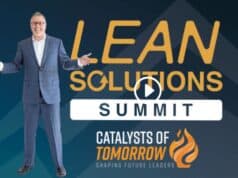Thanks as always to Ryan McCormack for this… there's always so much good reading, listening, and viewing shared here by him! Get these directly from Ryan via email.
Insights about improvement, innovation, and leadership…
Operational Excellence, Improvement, and Innovation
Fit Gap?
Ugh. So much time is wasted torturing and transforming data. As a young process engineer, I was taught that process data needed to be “fit” to a statistical distribution, or at least transformed so that it could fit a distribution in order to assess its capability to meet specifications and calculate DPMO rates. Dr. Donald J. Wheeler (author of the classic and indispensable book Understanding Variation: The Key To Managing Chaos) demonstrates that it probably doesn't matter what distribution you use to fit your data when assessing its capability. Starting with a process behaviour chart before assessing capability is recommended.
How to Design for Disruption
Can you plan for disruption? It's easy to become fatalistic about strategic planning in an increasingly uncertain landscape, focusing less on choices and more on resilience or the ability to pivot quickly. Some choices can still be made intentionally. How to design for disruption.
Immune to Innovation
Establishing an innovation practice within a lumbering bureaucracy rarely propagates new thinking through the system. Industrial-era management is like an auto-immune system that turns on anything attacking its resilient principles, processes, and reward mechanisms. Steve Denning shares How Industrial-era Management Kills the Entrepreneurial Spirit – Part One.

Creating a Culture of Improvement
The “Working Together” Management System
Principles, practices, behaviours, and management systems. Legendary CEO Alan Mulally (Boeing Commercial Aircraft and Ford turnaround specialist) shares the secrets of his successful approach to driving cultures of excellence in this excellent podcast. In addition to some enduring examples of how his Business Review Process drives performance, there are additional links to his one-pagers. Highly recommend the investment of 80 minutes on your commute or treadmill.
Neutron CEO
Jack Welch may have fired more people than any other single corporate executive in history. And he liked it. Welch was venerated in his day for achieving results at all costs. Was Jack Welch the greatest CEO of his day – or the worst?
Beware of Culture
This month, a toxic workplace culture is being declared a health hazard by the US Surgeon General. Most organizations tout a “safety-first” culture, but this is usually limited to protecting the immediate physical health of employees. A true safety culture extends well beyond PPE and safe work procedures.
These are the 5 worst signs of a toxic workplace.
The Customer Comes Second
The late, legendary CEO of Southwest Airlines, Herb Kelleher's advice lives on through his mentees, including Chip Conley, who established a relationship with Kelleher without ever meeting him.
Coaching – Developing Self & Others
Getting to ‘No'
Burnout is rampant, and there doesn't appear to be any simple solutions. Setting healthy workplace boundaries is helpful, but many of us struggle to say ‘no' at work. Here is some advice on How to Say ‘No' At Work.
Be honest now…
Feedback may be the most essential ingredient for coaching and development, but honest feedback requires trust. “Upward” feedback requires even more trust. I'll admit to being careful about providing feedback to my boss or other senior leaders when they ask for it, and that got me thinking, “does my team give me honest feedback?”. Here's how to encourage your team to give you honest feedback.
Just the facts
We all used to talk frequently about fact-based decisions as a key leadership competency, and it was understood that data gathered directly from the source was a reliable indicator of the truth. Fast forward to 2022 where data is mistrusted and often from dubious sources, facts are subjective, and managers are expected to make many more decisions more quickly with less reliable information. How are managers expected to make high-quality decisions when the amount of unreliable information has exploded? Use evaluative thinking to get all the established facts before deciding what's true.
Follow Ryan & Subscribe:
LinkedIn: https://www.linkedin.com/in/rjmccormack/
Subscribe to receive these via email
Please scroll down (or click) to post a comment. Connect with me on LinkedIn.
Let’s build a culture of continuous improvement and psychological safety—together. If you're a leader aiming for lasting change (not just more projects), I help organizations:
- Engage people at all levels in sustainable improvement
- Shift from fear of mistakes to learning from them
- Apply Lean thinking in practical, people-centered ways
Interested in coaching or a keynote talk? Let’s talk.
Join me for a Lean Healthcare Accelerator Trip to Japan! Learn More










